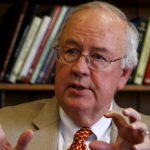WASHINGTON (RNS)—For years, Ken Uptegrove believed another Great Depression was at hand.
A computer professional in Springdale, Ark., Uptegrove started a garden and researched ways to live more simply. He studied the lives of early Christians and launched a ministry and a website where he and his wife share their beliefs with about 100 visitors a day.
Ideally, one day they’ll move to a remote area with other self-sufficient Christians where they can raise their own food and be ready should things get any worse.
|
Actor Woody Harrelson plays survivalist Charlie Frost who tries to warn others about pending Armageddon in the movie 2012.
|
They do not call themselves survivalists per se, but inherent in their way of life is the Christian ideal of neighborliness, he said. Surviving is not about saving yourself alone, but about coming through disaster with enough strength to help your neighbors, too.
“We are not militia. We are not an armed camp. We simply describe ourselves as first-century Christians,” said Uptegrove, 74. “It is always just simply living the Christian community lifestyle and being ready for (Jesus’) return as if it will happen tomorrow, but at the same time being ready to live our life and being ready for a full life.”
In the wake of 9/11, war, hurricanes, the worst recession in decades and countless other woes, preparation and survivalism are no longer fringe activities. In fact, for some Christians, current events yield signs of the End Times and Jesus’ Second Coming.
Government leaders warn of rising unemployment and worldwide pandemics. Movies such as 2012 stoke fears about looming Armageddon, while TV shows such as Man vs. Wild make survivalism hip.
Sustainability and self-sufficiency seem downright mainstream, led by first lady Michelle Obama’s White House vegetable garden. Mormon beliefs in stockpiling food and supplies no longer seem quaint, but maybe something worth looking in-to.
“We as Americans have this sense of personal responsibility and efficiency,” said Richard Mitchell Jr., a professor emeritus at Oregon State University and author of Dancing at Armageddon: Survivalism and Chaos in Modern Times.
Sign up for our weekly edition and get all our headlines in your inbox on Thursdays
“Individually we can solve those problems, and that we don’t live in an easy world or one that is consistent but one that requires focused reaction and cooperation and sort of individual grit.”
Across the Internet, message boards, blogs and businesses promoting survivalism are flourishing. Living Fresh, an online store that sells emergency supplies, has seen business jump as much as 700 percent, owner Joe Branin estimated.
The popular myth has been that survivalists are Rambo types, Mitchell said. Instead, survivalists often are urbanites or suburbanites who distrust the government or believe the government is flawed. For the less hardcore, the concept perhaps renders a measure of control they feel they have lost to disasters or 9/11, Branin said.
“This is one way people feel like they’re taking control of their own situations again,” he said. “We’ve had so much drama. It’s like getting your oil changed in your car. You’ve done something that feels good. It’s the same way with somebody going down and getting a survival kit and having extra food or water. It gives them that level of a little bit of security.”
Of course, doomsday fads come and go. In the 1830s, New York farmer William Miller saw the return of Jesus in 1843, which led to the “Great Disappointment” but also the birth of the Seventh-day Adventist Church. Similar End Times predictions led to the founding of the Jehovah’s Witnesses.
Some say the hype is fueled by the government and the media. Just ask anyone who worried about Y2K a decade ago, or the 2003 government directive to stock up on duct tape to seal homes from a chemical or biological attack.
But being prepared isn’t all bad, Mitchell said. If survivalists are gardening because they feel the U.S. should be less dependent on foreign countries for food or even energy, maybe they’re on to something. And if survivalists distrust government and economic systems they don’t completely understand, perhaps the recession has proven they have a point.
New technology is helping measure progress toward completing Jesus’ Great Com-mission to make disciples of all nations, said Allan Beeber, who runs the online Global Media Outreach missionary effort for Orlando-based Campus Crusade for Christ.
Many Christians believe the Great Commission must be fulfilled before Jesus can return, and at the rate the ministry is growing, Beeber believes it’s possible the job might be completed by 2020, maybe sooner.
Then again, he’s not making any specific plans.
“It may happen in our lifetime. I just don’t wake up everyday thinking today’s going to be the day. I just don’t do that. I’ve been through too much,” he said.
“I do believe the Scriptures will be fulfilled someday, but I think the timing will surprise every one of us.”
















We seek to connect God’s story and God’s people around the world. To learn more about God’s story, click here.
Send comments and feedback to Eric Black, our editor. For comments to be published, please specify “letter to the editor.” Maximum length for publication is 300 words.